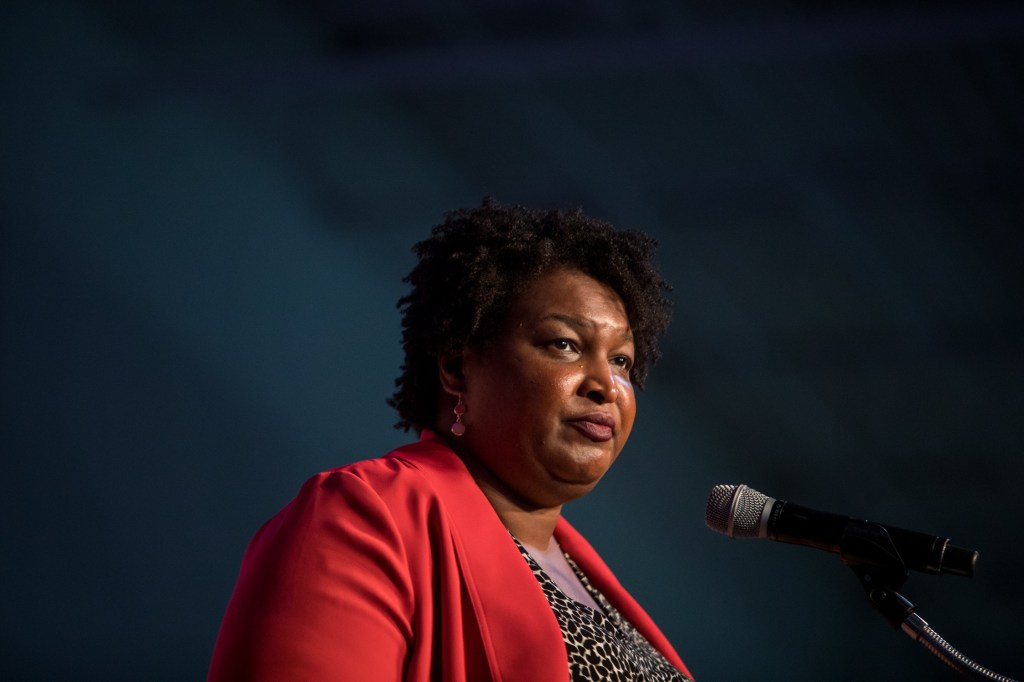Protections for disabled voters can jeopardize communities of color, advocates say
Published 2:30 pm Tuesday, November 19, 2019

- In this Sept. 15 file photo, Stacey Abrams speaks at a Supermajority event in Atlanta.
ATLANTA — Advocates of disabled voters condemned Georgia’s record of using American Disabilities Act compliance to close polling places in black communities.
At a voter suppression panel Tuesday, the Democratic Party of Georgia and advocates were joined by 2018 gubernatorial candidate Stacey Abrams, hoping to bring attention to the obstacles disabled voters face.
Abrams said their party did win the 2018 election in a way, by changing the way elections look in Georgia.
“But we didn’t win the title,” Abrams told the crowd, “and the reason we didn’t get the title, in no small measure was voter suppression.”
Voter suppression for disabled voters can come in many forms, she said, like not being able to physically cast a ballot because of constraints of the polling location or not being automatically registered to vote through the DMV because they don’t use a driver’s license.
“If you’ve got to prove every single time there’s an election that you have the right to be heard,” Abrams said, “eventually they’re just going to fall silent out of exhaustion. And we know for the disabled community, this is a hurdle that is put in place, every single time.”
Abrams addressed the controversial voter purge by the Secretary of State’s office that garnered national media attention. Disabled voters who have a history of missing elections because of physical barriers, she said, are among the first to be taken off the rolls.
The use of American Disabilities Act compliance as a way to exclude voters and close polling places was brought up by every speaker. Abrams mentioned religious organizations that volunteer as polling places are also exempt from compliance.
Sara Tindall Ghazal, voter protection director for the Democratic Party of Georgia, said poll closures throughout Georgia, predominantly in black communities, have used “ADA compliance as a weapon,” noting Georgia has hundreds of polling locations since the Voting Rights Act wasn’t renewed.
Rebecca Cokley, director of the Center for American Progress and disabilities rights activist, shared her own experiences facing obstacles as a disabled voter.
Cokley recalled going to vote with her dad who was paralyzed, only for him unable to enter the polls because his wheelchair didn’t fit through the door of the church polling location.
Years later as an adult, Cokley, who has dwarfism, was once asked by a poll worker for her ID to “make sure she wasn’t a child.”
Cokley’s organization does work surrounding laws that affect disabled voters such as guardianship laws that prevent individuals from voting if they are in the care of someone else. If voting day was made a holiday, she said, transportation to polls would be harder for disabled voters because public transportation schedules would change on that day.
Advocates mentioned bringing in disabled voters as poll workers, to broaden representation at polls and to make sure protections for disabled voters aren’t being used to exclude communities of color.
“We have to be patient, and we have to be really vigilant, not just for our own communities,” Cokley said, “but we have to be vigilant across our communities. And so when the disability communities, specifically, see issues impacting folks of color with or without disabilities, we have the responsibility to speak out about it.”
Abrams mentioned Georgia’s brand-new voting system that has caused some voting rights activists to sue the state for a variety of reasons.
“We know that accessibility is about not only can you get in the building, but can you get to the machine,” she said. “And if we have voting machines that do not take into account the needs of the disabled community they are not right for our democracy.”
Vincent Olsziewski, a political consultant and advisor on disability rights, is visually impaired and took a different stand about the push for hand-marked paper ballots. If the system was reliant on hand-marked paper ballots, he said, he would need assistance voting.
“Hand-marked paper ballots disenfranchise a number of people,” he said. “People with disabilities … people who are older or who can’t read. We need to have a machine that is accessible to all.”




